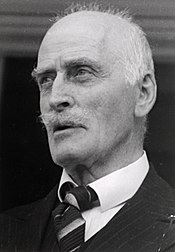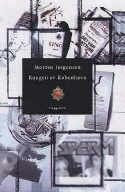However, no matter how skilled the author may be, personal experience is unsurpassable, and on-the-spot observation superior.
In the theater, there are two extreme approaches to acting:
*So-called method acting, as theorized and institutionalized by the great Russian director and actor Constantin Stanislavski (1863-1938). The essence of method acting can be described within the framework of terms like empathy, identification and even experiencing. The actor immerses himself or herself in another personality, "becoming" that person.

* Classical acting, in the tradition of William Shakespeare and Henrik Ibsen, where an actor develops skills. Or, as the seasoned and gifted Norwegian actress Anne Krigsvoll commented once in a private setting, upon being told by somebody that she seemed to identify strongly with her character in a particular movie: "Identify? Me? Ha! I am a classical actor, I have technique." If a character is sad, then the actor uses her or his technical skills to express it.
As in theater, so also in literature. I subscribe to what can be called method writing.
I do not write about my characters. I become them, I live them. I walk like them, I eat like them, and gradually I start to understand them, maybe even getting to know them.
I do it literally. I go to the mall as them, as if I were an actor. I "enjoy" their favorite ice cream, even though I personally may be allergic to those walnuts. I go to MacDonald's and eat their sloppy burger, while I as a private person never eat anything whatsoever from or at a MacDonald's. I don't equip my characters with hobbies or idiosyncrasies, they find their own, often on pure impulse, like normal people. I never write about The Teacher or The Nurse. I write about actual people, about individuals. I do not design them, they grow themselves like plants.
In his 1881 lecture “Norwegian literature” , the Norwegian Nobel Laureate, Knut Hamsun, said about his colleague, the playwright and poet Henrik Ibsen:
“Ibsen‘s persons far too often have been just vehicles ("apparatuses"), who come forward, representing concepts and ideas … Priests are hypocrites, the common people are being violated, Latin and Pontoppidan murders little children fervently to death, merchants seduce young girls.”
These characters are not real, they are templates, cliches, card board characters with no depth, just a mishmash of characteristics. Their makers have snatched the measuring stick of Dashiell Hammett, Raymond Chandler and others, making the format universal.
There is an army of crime hacks out there who build their characters as if people are sets of Lego bricks. And I will never, ever read "a relationship novel", unless you count Murphy or Le Bleu de Ciel as one.
PLOTS AND STORYS
When I wrote my second novel, “Kongen av København” (The King of Copenhagen), I knew the character “King” from my first novel. But, hey, I hadn’t associated with him for 10 years. Surely, he would have changed?
The most frustrating questions I get from the press are: “What do you want to say with this book?” and “What is the story in the book about?” Morons! It is a story. My books “say” nothing, they have no purpose other than telling a story, creating a coherent text.
No, I am not "Brent". I always try to distance myself from my characters. If I write something autobiographical at a later stage in my authorship, I'll let you know. On the contrary, I enjoy writing about The Other.
Most readers were fooled by The Mustard Legion. Droves of people, including reviewers, thought I was expressing opinions, that I "was" the main character, "TT", or at least that I was sympathetic to him. In King of Copenhagen he is exposed as a liar and a coward. What a jerk. I never even liked him.
RESEARCH
Before I started physically writing The King of Copenhagen, I travelled to Copenhagen. I had absolutely no idea what the storyline would be. I planned next to nothing.
From my publisher J.W. Cappelen AS I acquired a generous amount of money down, sufficient for me to travel as “King” to Copenhagen for a fortnight. As “King” had always been a heavy drinker, it was evident to me that he, ten years after, would have become somewhat of an alcoholic.
So off to Copenhagen I went, with enough money to be drunk for 14 days, carrying a tape recorder and a camera, as I knew I would spend parts of my time there in a haze. And, just for the record, I am unable to write if I drink.I did not enjoy it. Growing up, I was surrounded by drunks, my father a junkie, the continuous use of alcohol has always been a no-no to me. Even as a notorious punkrock madman in the 80ies, I rarely drank any alcohol at all for more than two days in a row, or three times a week, even though I can assure you I know how to party hard, and in spite of the fact that I certainly don't mind ten pints of Guinness on occasion. But when my friends drink beer in the afternoon, I tend to stick to coffee.
Not only that. I told people my favorite liquor was Jack Daniel's, a liquor I have always detested. The fact that I managed to pour into my sensitive gullet this disgusting, syrupy substance for 14 consecutive days, and lots of it, too, is only due to my total and uncompromising dedication to the craft of the novelist. Seriously.
Did I have to do it? Yes, because I wanted “King”’s hangovers, and nothing, except maybe very old cognac and bad moonshine, gives you a worse morning after than a 40 % proof liquor containing lots and lots of sugar. Well, couldn’t I have leaned on my own hangovers? No, I wanted his.
Robert DeNiro put on weight to play Al Capone, while Christian Bale lost 60 pounds before he became Trevor Reznik in The Machinist. Both method actors, of course.
So there I walked Copenhagen as if I was “King”. Things happened. Scenes I never could have constructed took place, but because they developed originally in the real world, acted out by real people, the story got just that little bit of extra edge, an element of unpredictability.
The Method always adds some obscure detail, some inconsistency, a lack of linearity; it strengthens the credibility of the text. A surprising smell, a cameo, a dog, it can be anything.
I went home to Oslo and wrote the book, and 90 % of what is depicted in the book, is more or less exactly what happened during my stay in Copenhagen.
HOW TO LIE, MANIPULATE AND IMPRESS PEOPLE ... NOT!Yes, I involve other people. I manipulate, I lie. I posed as “King” in Copenhagen, introducing myself as him if need be, telling strangers that I had been awarded ten Norwegian Grammys. I behaved like an idiot at times, on purpose, to get unique and unpredictable reactions, and most of the embarrassing situations in the book, are the result. I acquainted people whom I would never have approached as a private person. I hit on girls that did not appeal to me. At all.
MORAL ANGUISH AND LIMITS TO MY MADNESS
Naturally, there are limits to what I’ll do, and lines I will not cross, either for personal or ethical reasons, or both. These borders will be severely tested while writing Brent, as Brent is as story of criminals and crime.
Not only that, but there are villains in the book. It is not exactly pleasant to be inside the minds of psychopaths, mass murderers, pedophile cannibals, or serial killers. Being a method writer can be extremely hard on the psyche.
It can also be dangerous. Before I wrote the death scene in "Sennepslegionen" (The Mustard Legion), in which Brian II dies of an overdose, I bought myself half a gram of heroin, which I smoked. I felt that I had to. I haven't touched it since, and I did not like it. But I had to know, I had to understand.
A METHOD NOVELIST IN BEIJING
But now, as I am headed for Beijing on research for my forthcoming novel Brent, I don’t expect to "suffer" all that much, or put myself in danger. There will be other research travels for Brent at a later stage that are bound to become substantially more hairy. And when I write the mid section of volume 1 of Brent, I expect to become a social recluse for a period of time. I don't want other people around me as I walk with the mind of the proverbial homicidal maniac.
The only thing I dread in Beijing, is that I have to eat dog. Dogs are my friends. I love dogs, and I still miss Basse (RIP). But I need to eat dog, I must. “Tasted like” or somebody else's taste buds is not good enough. I shall eat dog in the shape of “Brent”, and I have no idea how he will react. (I hope he pukes, but he probably won't.) I will have to prepare myself psychologically, just like a soldier before his first battle, or a parachutist before her maiden jump.
I have done some Beijing research, and I have friends that have been to Beijing, or lived there. But I am trying to keep my knowledge down to an absolute minimum, as Brent comes totally unprepared to Beijing. He has never been there, he speaks absolutely no Chinese, and he does not know a thing about the China he is visiting, a China that within a few decades will be the dominant global economic power. What Brent knows about China, is what is publicly known among those who on a regular basis read magazines like Time, New Scientist and National Geographic. High school knowledge, plus news watched and read on a daily basis through life. But "Brent" has no idea how to ask for directions, or how to board a subway. So no Chinese glossaries for me before leaving, no reading that contains too much details. On the other hand, when Brent takes place, most Chinese are fluent in English, as Brent is a novel from the future.
I shall be a stranger in Beijing. A somewhat shy entomologist, completely on his own and absolutely out on a limb. I shall eat what Brent eats, I will choose his kind of movie, I shall buy his clothes, I shall blush, I shall be modest, I shall only listen to classical music. I may cry in my hotel room, I may let myself be intimidated, I may embarrass myself, loyal as I am to my character.Other authors have their ways. I am not saying that my method is superior to others, or that I am the only one to work like this or in similar ways. But this is how I do it. It's the method to my madness.
And, sure, I also master the classical skills. My previous novel Bank (German edition: Rache auf Raten) was written in six weeks without any research. But that was the whole point, it was why I wrote it: I wanted to prove to myself that I could write entirely from my imagination.
And as most of Brent will be written in my imagination, it is imperative to me to balance the bulk of Brent with something which is very earthy and real.
In Beijing, I will most likely spend no time whatsoever in libraries, I'll go method writing. It will be a blast.
I will be blogging from Beijing on BRENTBLOG, and you will also be able to follow me on Facebook, Twitter, Gowalla and other social media.





















